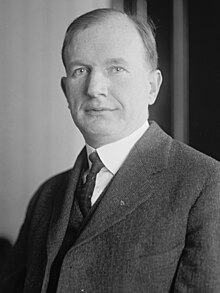
Back بورتون كى. وايلير ARZ برتون کی. ویلر AZB Burton K. Wheeler German برتون کی. ویلر Persian Burton Kendall Wheeler French Burton K. Wheeler Hungarian Burton K. Wheeler Latin Уилер, Бёртон Кендалл Russian Burton K. Wheeler SIMPLE Burton K. Wheeler Swedish
Burton Wheeler | |
|---|---|
 Wheeler in 1922 | |
| United States Senator from Montana | |
| In office March 4, 1923 – January 3, 1947 | |
| Preceded by | Henry L. Myers |
| Succeeded by | Zales Ecton |
| United States Attorney for the District of Montana | |
| In office 1912 – October 1918 | |
| Member of the Montana House of Representatives | |
| In office 1910–1912 | |
| Personal details | |
| Born | Burton Kendall Wheeler February 27, 1882 Hudson, Massachusetts, U.S. |
| Died | January 6, 1975 (aged 92) Washington, D.C., U.S. |
| Resting place | Rock Creek Cemetery Washington, D.C., U.S. |
| Political party | Democratic |
| Other political affiliations | Progressive (1924) |
| Spouse | Lulu White |
| Children | 6, including Frances |
| Education | University of Michigan (LLB) |
Burton Kendall Wheeler (February 27, 1882 – January 6, 1975) was an attorney and an American politician of the Democratic Party in Montana, which he represented as a United States senator from 1923 until 1947.[1]
Born in Massachusetts, Wheeler began practicing law in Montana almost by chance, after losing his belongings while en route to Seattle. As the U.S. Attorney for Montana, he became known for his criticism of the Sedition Act of 1918 and defense of civil liberties during World War I. An independent Democrat who initially represented the progressive wing of the party, he received support from Montana's labor unions in his election to the Senate in 1922.
As a freshman senator, Wheeler played a crucial role in exposing the Harding administration's unwillingness to prosecute people involved in the Teapot Dome scandal.[2] He ran for vice president in 1924 on the Progressive Party ticket headed by Wisconsin Senator Robert La Follette Sr. An ardent New Deal liberal until 1937, Wheeler broke with President Franklin D. Roosevelt on the issue of packing the Supreme Court. In foreign policy, from 1938 to 1941, he became a leader of the non-interventionist wing of the party, fighting against entry into World War II until the attack on Pearl Harbor.
Wheeler lost reelection in 1946 and retired to private practice in Washington, D.C.
- ^ Howard, Joseph Kinsey (March 1947). "The decline and fall of Burton K. Wheeler". Harper's Magazine. March 1947. Harper's. Retrieved May 19, 2019.
- ^ "Burton K. Wheeler, Isolationist, Dies". The New York Times. January 7, 1975.